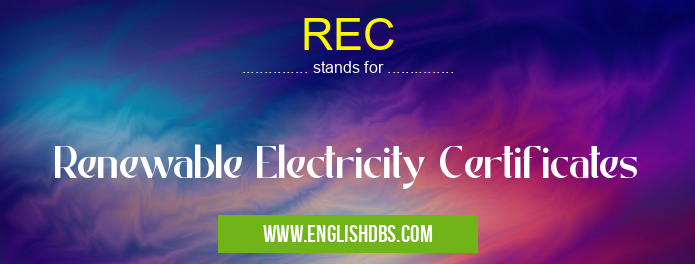What does REC mean in UNCLASSIFIED
REC or Renewable Electricity Certificates is an environmental label and certification program designed to promote the use of renewable energy in the United States. It is a market-based mechanism which encourages the development and deployment of renewable energy. RECs provide incentives for electric utilities, businesses, and consumers to invest in renewable energy sources like wind, solar, geothermal, and hydropower instead of traditional fossil fuel powered sources. By buying RECs companies can green their operations even if they do not own the wind farm or other renewable energy facility.

REC meaning in Unclassified in Miscellaneous
REC mostly used in an acronym Unclassified in Category Miscellaneous that means Renewable Electricity Certificates
Shorthand: REC,
Full Form: Renewable Electricity Certificates
For more information of "Renewable Electricity Certificates", see the section below.
What RECs Mean
Renewable Electricity Certificates (RECs) represent the environmental benefits associated with producing electricity using renewable sources such as wind, solar, biomass, geothermal, and small hydroelectric resources. Governments issue these certificates as proof that 1 megawatt-hour (MWh) of electricity was generated from a renewable source. Each REC represents an equivalent number of units of electricity generated by utility-scale renewable facilities. As these certificates are traded in regional markets across North America they allow market participants to purchase clean power without having to build additional generating capacity themselves.
Benefits Of RECs
The benefits from buying Renewable Electricity Certificates (RECs) include reducing carbon emissions associated with electricity generation which causes climate change and environmental degradation; creating economic value for communities located near renewable energy projects; helping to meet sustainability goals; sending a message to stakeholders about commitment to environmentally responsible practices; and demonstrating corporate responsibility leadership in supporting innovative clean technology solutions. Corporate buyers have also increased their demand for RECs as part of wider initiatives towards sustainability that includes promoting their own green credentials or investing in social projects within local communities where their operations are located.
Essential Questions and Answers on Renewable Electricity Certificates in "MISCELLANEOUS»UNFILED"
What is a Renewable Electricity Certificate?
A Renewable Electricity Certificate (REC) is a tradable, non-tangible energy commodity which represents proof that 1 megawatt hour (MWh) of electricity was generated from an eligible renewable energy resource such as solar, wind, or geothermal. RECs are created when one Megawatt Hour of electricity is generated and delivered to the electricity grid.
Who Purchases RECs?
RECs can be purchased by utilities, corporations, government entities, universities and individuals who use them to demonstrate commitment to renewable energy and meet sustainability objectives.
How are the environmental attributes tracked for RECs?
Environmental attributes associated with the generation of a MWh of renewable electricity are tracked through compliance registries like those administered by the Northeast States for Coordinated Air Use Management (NESCAUM), California Air Resources Board (CARB), Western Regional Energy and Offset Registry (WREOR), Midwest Renewable Energy Tracking System (M-RETS), American Carbon Registry, PJM GATS (PJM Generation Attribute Tracking System).
Why do companies purchase RECs?
Companies use RECs in order to demonstrate their commitment to renewable energy while helping fund new green projects. By purchasing a REC they can show that part of their overall power use was offset by wind or solar generation. This helps both the local environment as well as supporting the growth of clean technology.
What types of industries can benefit from buying renewable energy certificates?
Any industry that uses electricity can benefit from purchasing RECs including technology companies, manufacturers, retailers and hospitality establishments. By purchasing RECs industries have the opportunity to reduce their carbon footprint while contributing to cleaner air quality.
Final Words:
In conclusion, Renewable Electricity Certificates (RECs) are a great way for businesses to reduce their carbon footprint while still being able to access clean power from renewable sources without having to actually build additional generating capacity themselves. They also provide economic opportunities for local communities near new generation facilities and demonstrate corporate responsibility towards sustainable development initiatives. Consequently demand for Renewable Energy Certificates has been increasing steadily among responsible corporations who recognize how important it is that we move away from our reliance on fossil fuels as quickly as possible before it is too late.
REC also stands for: |
|
| All stands for REC |
